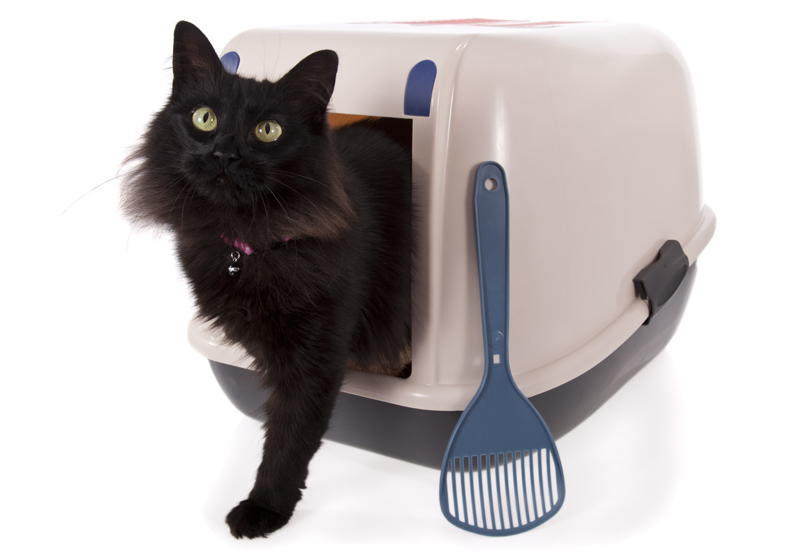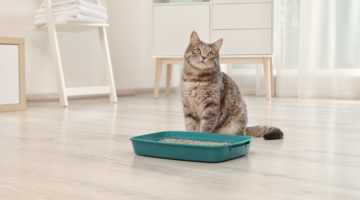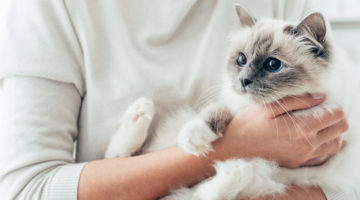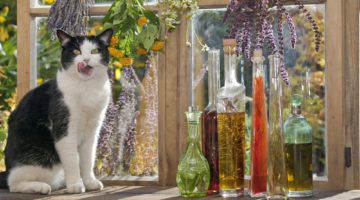Earth-friendly kitty litter helps ease the burden on landfills… and improves the health of your pet.
What do nutshells, pine wood, corn and wheat all have in common? They’re part of a growing trend that’s replacing clay with biodegradable and sustainable cat litters. In fact, the American Pet Products Association calls earth-friendly litters one of the top trends for 2011. Marty O’Brien of Purr & Simple natural cat litter estimates there are well over 80 million cats in America, and 84% of their caretakers use litter. “That’s nearly 69 million litter boxes being emptied weekly or bi-weekly,” he says. It doesn’t take much imagination to see what an impact all that litter is having on landfills.
Sustainability is the new byword
Marty’s company manufactures litter from nutshells, turning a once discarded by-product into something useful. He is seeing the trend toward more eco-friendly litters first hand. “Everyone is considering sustainability these days,” he says. “I think the media, combined with the mindset of our generation, can be credited for making sustainable practices possible.”
Mark Hughes, national sales manager for Swheat Scoop wheat cat litter, agrees the alternative litter category is booming. “It’s the only growing segment of the cat litter industry,” he says. “Surveys show clay litter sales declining over the past five years.” Mark predicts continued popularity for earth-friendly clay litter alternatives. “People are taking better care of themselves, eating better, and using natural products, and they’re looking for the same thing for their animals.” Marty agrees with this assessment. “People think of their pets as family members and are looking for healthier options,” he says.
Benefits are twofold
Natural products made from plant-based sources like nutshells, wheat, pine and corn, with no additives, are better for cats in several ways. They tend to have low dust, which reduces allergies and respiratory problems, and are less likely to stick to long-haired cats. They are also non-toxic to kittens, which often ingest litter when learning how to use the box. “Adult cats also ingest litter when they groom,” Mark says. “Clay can plug them up and cause medical problems. A biodegradable material like wheat will pass right through them.”
But one of the biggest advantages of alternative litters is that they reduce the carbon pawprint of the domestic cat. If everyone used natural cat litter alternatives, it would have a whopping impact on landfill space. Although clay is a natural substance, it still takes a toll on landfills because it’s a durable, rock-based material that does not break down. And traditional clumping products contain bentonite, which is obtained through strip mining. Other mainstream litters often also include additives such as artificial fragrances, which come from chemicals that aren’t good for the environment.
Shopping tips
If you want to do your part in keeping clay litter from clogging up landfills – and support your cat’s health while you’re at it – here are three simple steps.
- Research alternative litters. Browse pet stores, search online and read opinions on cat-related forums. Chat with fellow feline guardians who are already using eco-friendly litter to find out what they like about their current brands.
- Carefully read the ingredients of any brand you are considering. It should preferably contain a single biodegradable material. Also, keep in mind that there’s no universally accepted definition for the word “natural”. A truly earth-friendly product is made from sustainable materials and has no added ingredients because its natural enzymes control odor. If scent is added, as in the case of World’s Best Cat Litter, a biodegradable corn-based product, it should come from a natural, non-toxic source – in this particular case, the fragrance comes from lavender rather than artificial chemicals.
- Introduce your cat to the new litter slowly. Cats generally accept alternative products if you are patient and give them enough time to adjust. Add a small amount of the new product to your current litter until the cat accepts it. Eventually, you can move entirely to the new litter and complete the transition to an earth-friendly litter box!
Eco-friendly litters
Feline Pine, www.felinepine.com
Litter made from pure pine
Only Natural Pet Store, www.onlynaturalpet.com
Sells litters made from a variety of materials, including whole-kernel corn, wheat, pine and nutshell
Purr and Simple, www.purrandsimple.com
Litter made from nutshells
Swheat Scoop, www.swheatscoop.com
Wheat-based litter
World’s Best Cat Litter, www.worldsbestcatlitter.com
Made from whole-kernel corn







No Comment